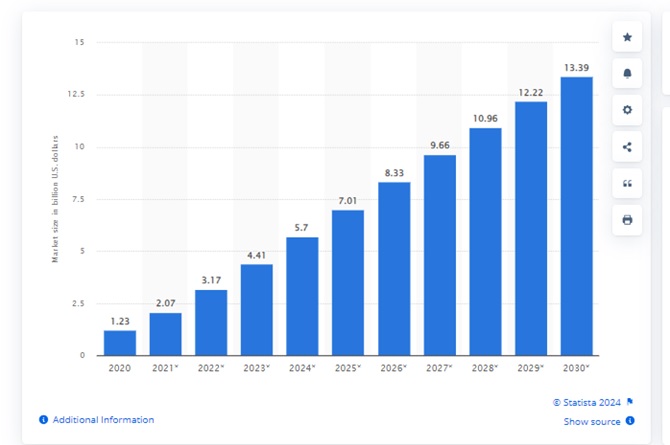Home »
Articles
Transforming the Healthcare Landscape: The Role of Robotic Process Automation in Healthcare Industry
By Michael Kanner Last updated : January 19, 2024
The healthcare industry is embarking on a monumental transformation, embracing innovative technologies to enhance efficiency, reduce costs, and elevate the patient experience. At the epicenter of this change is robotic process automation (RPA), an intelligent automation solution redefining healthcare operations. RPA for healthcare offers immense potential to overcome pressing challenges, from administrative burdens to suboptimal patient outcomes, revolutionizing healthcare delivery. This emerging technology promises to shape the future of healthcare through optimized processes, empowered professionals, and satisfied patients. The fast industry growth only confirms that.

Robotic process automation (RPA) market size worldwide from 2020 to 2030 (in billion U.S. dollars)
Addressing Healthcare's Pressing Challenges
The healthcare sector grapples with numerous systemic challenges compromising efficient operations and quality care delivery. Administering healthcare plans consumes excessive resources. Medical claims processing can have high error rates. Scheduling appointments involves tedious manual work. Empeek provides elegant solutions to these issues that have plagued healthcare for too long.
Streamlining Administrative Tasks
Administering healthcare plans and processing claims are labor-intensive. RPA bots can seamlessly handle these repetitive, rules-based tasks with near-perfect accuracy. Automating eligibility checks claims handling, billing, and payment posting optimizes these critical functions. This allows healthcare administrators to reduce manual work and redirect their efforts toward value-adding initiatives.
Enhancing Appointment Management
Scheduling and rescheduling appointments through traditional phone calls and emails is time-consuming. RPA bots can interact with patients digitally to confirm appointments, send reminders, and handle rescheduling automatically. This reduces the administrative workload for healthcare staff while ensuring patients arrive for booked appointments. The result - optimized schedules, lower wait times, and improved resource planning.
Revolutionizing Core Healthcare Processes
Beyond administrative tasks, RPA holds immense potential to transform core clinical and diagnostic processes. These solutions can drive greater efficiency in critical functions, enabling enhanced diagnoses and treatment.
Accelerating Diagnosis
Diagnosing conditions involves analyzing imaging scans and test results, which can be extremely time-intensive for physicians. RPA bots can take over the initial data processing task by comparing scans and results to clinical benchmarks in seconds. Doctors then evaluate only the most critical cases, expediting the diagnostic process. This allows quicker diagnosis and rapid initiation of appropriate treatment protocols for improved patient outcomes.
Optimizing Treatment Plans
Developing evidence-based treatment plans is essential but requires collating and analyzing voluminous medical data on precedents. RPA bots can undertake this groundwork, presenting physicians with synthesized insights on proven treatment pathways. Doctors can evaluate all options to determine ideal protocols, using their expertise where it creates the most impact, rather than performing repetitive research tasks.
The Patient Benefits of Healthcare RPA
While driving process optimization, RPA also delivers immense value for the most important healthcare stakeholders — patients. This technology enhances user experiences, removes access barriers, improves treatment quality, and enables better health outcomes.
Enhanced User Experience
By streamlining everything from appointment booking to discharge procedures, RPA-powered healthcare maximizes patient convenience. Quick scheduling, status updates, and discharge instructions keep patients informed. Digital self-service options give patients flexibility and control. RPA services for healthcare industry minimize the anxiety around healthcare access by facilitating transparent and efficient interactions.
Widened Healthcare Access
Lengthy queues and overwhelmed doctors often obstruct healthcare access. RPA establishes scalable solutions to broaden access through telemedicine services, automated appointment management, and accelerated diagnostics powered by artificial intelligence. More patients can get appointments, undergo assessments, and receive quality treatment, irrespective of location or socioeconomic barriers.
Improved Treatment Quality
Robotic process automation in healthcare optimizes core treatment processes through evidence-based insights and follow-up automation. Personalized treatment plans, automated medication dispensing, remote monitoring, and proper discharge instructions become viable. This standardized and comprehensive care continuum leads to superior clinical outcomes and patient recovery.
Better Health Outcomes
The overarching benefit of RPA adoption is tangible improvements in health outcomes. Quick diagnosis facilitated by automated analysis of scans and tests allows faster initiation of treatment. Personalized treatment plans and rigorous follow-up regimens also support patient recovery. RPA implementation helps healthcare providers enhance patient well-being holistically across the care cycle.
The Future of Healthcare Powered by RPA
RPA penetration in healthcare focuses mostly on supporting functions like finance and administration. However, the applications span the entire healthcare continuum as innovative use cases emerge. RPA is bringing the future forward, with solutions that were unimaginable even a decade ago now transforming healthcare delivery.
Virtual Healthcare Assistants
Chatbots and voice bots will reinvent patient interactions, providing personalized recommendations on health goals, appointments, medication, and queries. These virtual assistants will feel like an extension of the care team to each patient.
Predictive Healthcare Analytics
Patient data analytics using RPA and AI will gain precedence to predict risk factors the onset of health episodes and recommend precautionary steps. Detecting potential diseases early or on a preventive care basis, personalized risk profiling will define the future of population health management.
Automated Healthcare Facilities
Hospitals and clinics powered by interconnected RPA bots will minimize wait times through automated patient handling across various touchpoints. Smart workflow orchestration will enable swift diagnoses, treatment administration, and discharge supported by robots.
While the possibilities seem limitless, the change has already begun. RPA is driving the digital transformation of healthcare, heralding a new era of intelligent, efficient, and patient-centric care delivery. It brings hope for overcoming long-standing challenges to make quality healthcare accessible for all global citizens. This technology will require evolving mindsets, agile policies, and innovation-focused leadership. The technology, use cases, and patient benefits are clear. Ultimately, healthcare stakeholders' collective vision and efforts will determine how rapidly RPA can transform their organizations into intelligently automated care providers. The opportunity to reshape the global healthcare landscape beckons.
Advertisement
Advertisement